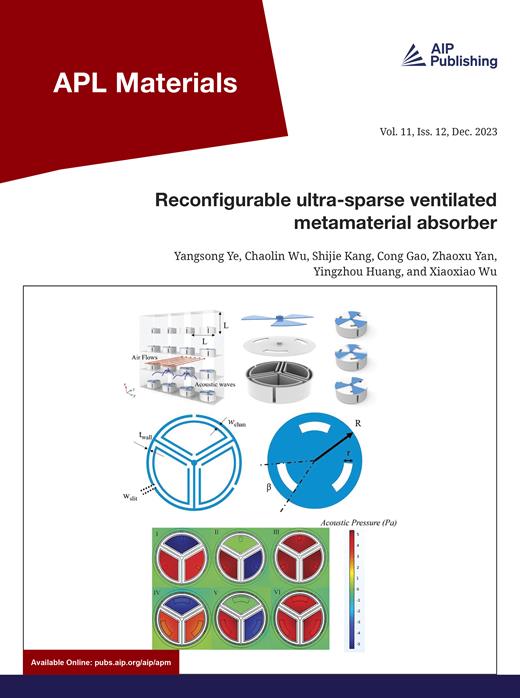Structural and magnetic properties of molecular beam epitaxy (MnSb2Te4)x(Sb2Te3)1−x topological materials with exceedingly high Curie temperature
IF 5.3
2区 材料科学
Q2 MATERIALS SCIENCE, MULTIDISCIPLINARY
引用次数: 0
Abstract
Tuning the properties of magnetic topological materials is of interest to realize exotic physical phenomena, new quantum phases and quasiparticles, and topological spintronic devices. However, current topological materials exhibit Curie temperature (TC) values far below those needed for practical applications. In recent years, significant progress has been made to control and optimize TC, particularly through defect-engineering of these structures. Most recently, we reported TC values up to 80 K for (MnSb2Te4)x(Sb2Te3)1−x when 0.7 ≤ x ≤ 0.85 by controlling the composition x and the Mn content in these structures during molecular beam epitaxy growth. In this study, we show further enhancement of the TC, as high as 100 K, by maintaining high Mn content and reducing the growth rate from 0.9 nm/min to 0.5 nm/min. Derivative curves of the Hall resistance and the magnetization reveal the presence of two TC components contributing to the overall value and suggest TC1 and TC2 have distinct origins: excess Mn in MnSb2Te4 septuple layers (SLs) and high Mn content in Sb2−yMnyTe3 quintuple layer (QL) alloys, respectively. To elucidate the mechanisms promoting higher TC values in this system, we show evidence of enhanced structural disorder due to the excess Mn that occupies not only Sb sites but also Te sites, leading to the formation of a new crystal structure for these materials. Learning to control defects that enhance desired magnetic properties and understanding the mechanisms that promote high TC in magnetic topological materials such as (Mn1+ySb2−yTe4)x(Sb2−yMnyTe3)1−x is of great importance to achieve practical quantum devices.具有超高居里温度的分子束外延 (MnSb2Te4)x(Sb2Te3)1-x 拓扑材料的结构和磁学特性
调谐磁性拓扑材料的特性是实现奇异物理现象、新量子相和准粒子以及拓扑自旋电子器件的重要手段。然而,当前拓扑材料的居里温度(TC)值远远低于实际应用所需的温度。近年来,人们在控制和优化 TC 方面取得了重大进展,特别是通过对这些结构进行缺陷工程。最近,我们报告了通过在分子束外延生长过程中控制这些结构中的成分 x 和锰含量,当 0.7 ≤ x ≤ 0.85 时,(MnSb2Te4)x(Sb2Te3)1-x 的 TC 值可达 80 K。在本研究中,我们通过保持高锰含量并将生长速度从 0.9 nm/min 降低到 0.5 nm/min,进一步提高了 TC,最高可达 100 K。霍尔电阻和磁化率的衍射曲线揭示了对总体值有贡献的两个 TC 成分的存在,并表明 TC1 和 TC2 有不同的来源:分别是 MnSb2Te4 七层 (SL) 中过量的锰和 Sb2-yMnyTe3 五层 (QL) 合金中高含量的锰。为了阐明促进该体系中更高 TC 值的机制,我们展示了由于过量锰不仅占据了 Sb 位点,而且还占据了 Te 位点而导致结构紊乱增强的证据,从而为这些材料形成了一种新的晶体结构。学会控制能增强所需磁性能的缺陷,了解促进磁性拓扑材料(如 (Mn1+ySb2-yTe4)x(Sb2-yMnyTe3)1-x) 中高 TC 值的机制,对于实现实用量子器件具有重要意义。
本文章由计算机程序翻译,如有差异,请以英文原文为准。
求助全文
约1分钟内获得全文
求助全文
来源期刊

APL Materials
NANOSCIENCE & NANOTECHNOLOGYMATERIALS SCIE-MATERIALS SCIENCE, MULTIDISCIPLINARY
CiteScore
9.60
自引率
3.30%
发文量
199
审稿时长
2 months
期刊介绍:
APL Materials features original, experimental research on significant topical issues within the field of materials science. In order to highlight research at the forefront of materials science, emphasis is given to the quality and timeliness of the work. The journal considers theory or calculation when the work is particularly timely and relevant to applications.
In addition to regular articles, the journal also publishes Special Topics, which report on cutting-edge areas in materials science, such as Perovskite Solar Cells, 2D Materials, and Beyond Lithium Ion Batteries.
 求助内容:
求助内容: 应助结果提醒方式:
应助结果提醒方式:


